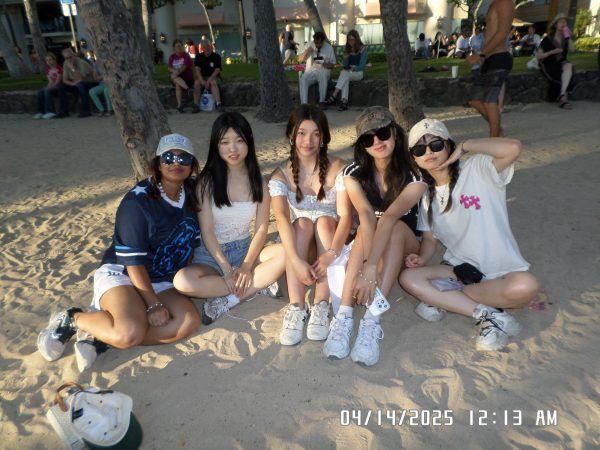The S-word: the prevalence of slut shaming at MVHS
Women address slut-shaming in their lives

“She was wearing a bralette; what did she expect?”
“What a whore; she’s slept with four guys.”
“She is such a slut; she deserves all this.”
Slut shaming refers to the practice of individuals criticizing females for engaging in behavior deemed to be provocative or enticing. Although men also receive critique in regards to their sexuality, they do so at a much lower rate compared to women. Thus, the term “slut” is often used to label females based on their sexuality, which encapsulates a wide variety of factors such as dressing style, sexual experiences and verbal and online interactions with others.
According to a study conducted by the American Association of University Women, slut shaming is among the most common forms of sexual harassment faced by middle and high school students. So prevalent is this practice that a third of all students report having experienced someone make unwelcome comments, jokes or gestures about them.
MVHS is not exempt from this statistic.
Despite only being in her first year of high school, freshman Tara Suresh has personally experienced — as well as witnessed — the effects of slut shaming. She believes that slut shaming is a phenomenon that affects people in all levels of high school, but it gets more severe as one grows up.
“As a freshman, I think slut shaming [refers to] what you wear, but I’m pretty sure as you get older, it’s more intimate,” Suresh said. “People throw around the word. You can call your friend a hoe, but you’re joking, but when it’s serious, that’s when it gets weird.”
Suresh says the first time she encountered slut shaming was within the first few months of her freshman year. After receiving a thread of screenshots from an acquaintances’ private Instagram post about her and her friend, along with a multitude of comments under the post agreeing and discussing private relationships and clothing, Suresh learned of the many opinions a particular group of freshmen had regarding her and her friend.
“Most of [the slut-shaming] occurred in the comment section, where they’re like, ‘She can’t even talk because she’s literally flat and wears stuff,’” Suresh said. “We confronted them on text, and then we confronted them in person, but [they continued doing it].”
Biology teacher Lora Lerner believes that the fact that this group persisted in its efforts to slut shame Suresh is reflective of the normalization of gender-based discrimination in society. She further argues that slut shaming is a type of gender violence that exposes the double standards imposed upon women.
At a young age, Lerner says females are told not to express their sexuality and go through life ashamed of their sexual life. A child’s upbringing in a culture that struggles to discuss these issues only reinforces this abusive behavior towards women as time goes on.
“There’s a huge long history of sort of this idea of controlling women through controlling their sexuality,” Lerner said. “It’s a woman’s issue in many ways because we really we take away everybody’s dignity, but we especially do it to women because they’re the ones who bear the brunt of the sort of shame around sex.”
Sophomore Sathvika Musuvathy, who experienced slut shaming for the first time in 7th grade and then throughout the rest of middle school, echoes a similar sentiment, explaining how those around her referred to her as a “slut” or a “hoe” because they felt that her short shorts were too promiscuous.
According to Musuvathy, her classmates’ decision to vilify her personality based upon her clothing choices demonstrates not only the double standards women face in their lives but also students’ growing disconnect with ideas of equality and fair treatment.
“For a while, I [wondered] why people were labeling me as a slut when I’m not, but after a while, I just learned to ignore it,” Musuvathy said. “I learned to ignore it because I talked to my mom about it, and she told me that it’s my clothes and I can do whatever I want.”
Recognizing that a student’s teenage years is when he or she is most impressionable to sexist attitudes and that this is a prime-time to hold discussions about noteworthy matters, Lerner makes an effort to address abuse against women during her sex education unit. Lerner says one impactful way to fight against slut shaming is to tackle the problem in conversations with her students. Some of Lerner’s students have approached her or have opened up on their own experiences with slut shaming.
“It’s not like I can fix it in a few weeks of sex ed, but [I] try to encourage people to really approach sexuality as not something to be ashamed of,” Lerner said. “The fact that this is a thing that we’re even openly discussing is a step in the right direction.”
Ultimately, Lerner wishes to instill a sense of confidence in her female students and a sense of responsibility in her male students. Having students open up to her about their experiences with slut shaming and sexual harassment at large is motivation for Lerner to initiate the conversation about this issue.
“We have to teach men that this is a thing and that they have to work on themselves to step up and be better,” Lerner said. “To step up and not speak about women that way, not treat women that way, and certainly not think it’s okay to be violent towards women.”








